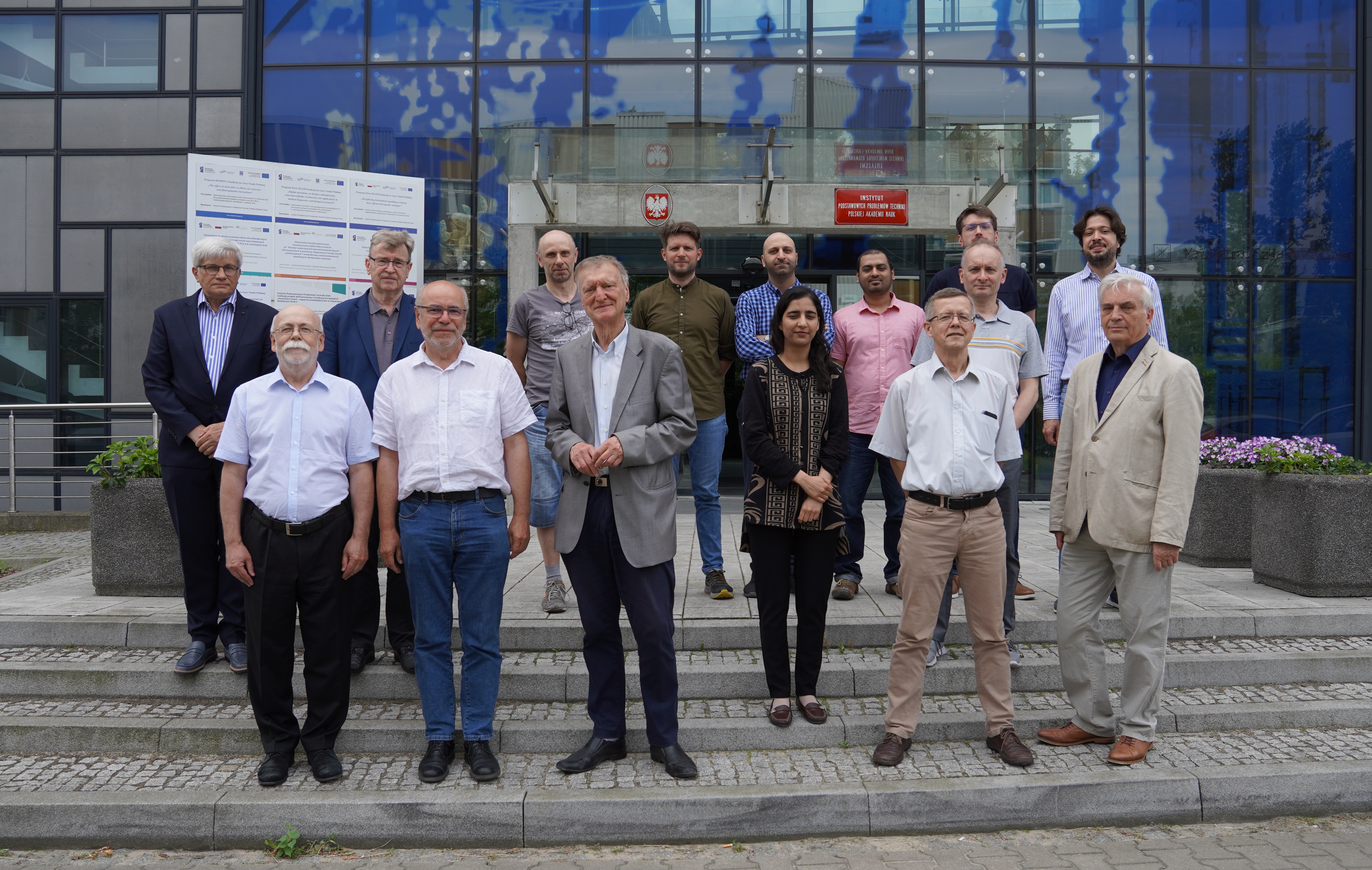Welcome to the Department of Information and Computational Science Official Website!
Here is an extensive list of our activities. Click on the tabs to learn more about the current research projects and achievements. For our employees’ contact details, just scroll down to the bottom of the page.
Employees and Teams
| Head: |  |
|
Piotr Kowalczyk, PhD, DSc phone: +48 22 826 12 81 ext. 257 room: 421 e-mail: |
| Secretary: |
|
Katarzyna Sikorska phone: +48 22 827 46 92 / +48 22 826 12 81 ext. 164 room: 426 e-mail: / |
Department structure units:

Research
Current Research Activities:
- Development of computational techniques for solid and structural mechanics applications
- Mechanics of shell structures
- classical and non-classical kinematical models (Kirchhoff-Love, Reissner-Mindlin, Cosserat, layer-wise theories and others)
- constitutive equations for shells: elastic, elastic-plastic,composites (multilayered, with microstructure), effective (homogenized, surrogate) material properties
- finite elements for shells: with rotational dofs, solid-shells and 3D
- various formulations and techniques improving elements’ performance; mixed, enhanced, stabilized, isogeometric elements, etc.
- advanced numerical analyses of shell structures (non-linear statics, dynamics, stability)
- Modeling of composite materials, including layered composites and metal-ceramic materials
- constitutive modeling
- damage and crack initiation in metal-ceramic compostes
- modeling of composites under complex extreme loading conditions: temperature load, impact load, high strain rates
- cohesive zone modeling, effects of diffusion in solids, temperature (microscale, mesoscale and macroscale)
- applied modeling methods: finite element method, peridynamics, molecular dynamics, ab initio methods
- Modeling of powder sintering technologies
- Modeling in biomechanics
- modeling of constitutive properties of tissues
- modeling of tissue growth and adaptive remodeling
- mechanical interactions between tissues and artificial implants
- Sensitivity analysis and optimization of nonlinear systems
- multi-criteria and reliability-based optimization
- Machine learning in computer image processing of the materials and engineering structures
- Atomistic/continuum modeling of crystalline mono- and hetrostructures with defects
- residual stresses caused by the crystalline defects and chemical inhomogeneities
- reconstruction of atomistic models of dislocation networks
- molecular dynamics/statics modeling
- optoelectronic and piezoelectric properties of semiconducting devices
- bandgap structure modeling in chemically inhomogeneous semiconducting structures
- elastic coefficients of 3-rd and higher orders in the quantitative nonlinear finite element modeling
- Neuroinformatics
- modeling of information processing in the brain using information theory and artificial intelligence
- development of artificial intelligence methods inspired by the architecture of real biological systems
- application of algorithms based on artificial intelligence and information theory in the field of medicine
- research in the field of extended reality and virtual environments
- Cryptology
- development of cryptographic systems and protocols using artificial intelligence and chaos theory
- defense mechanisms against AI model stealing
- Quantum information science
- exploring fundamental features of quantum systems, such as quantum entanglement, quantum coherence
- exploring the role of entanglement and general quantum features in quantum communication and quantum computation protocols
- application of quantum entanglement and coherence to detect and quantify memory effects in open quantum systems
Key Words:
- nonlinear mechanics, large strains, hyperelasticity, crystal anisotropy
- computational mechanics, finite element method, discrete element method
- biomechanics
- modeling, sensitivity analysis, optimization, reliability
- atomistic reconstruction, dislocations, extended defects, crystalline heterostructures, quantum dots, quantum wells, residual stresses, lattice distortion fields, molecular statics, molecular dynamics, piezoelectricity, bandgap structure
- peridynamics, molecular dynamics, ab initio methods, fracture defects, diffusion, cohesive zone model, impact loading, temperature loading, high strain rates, structural failure, fragmentation
- biologically inspired artificial intelligence, artificial intelligence in healthcare, computational intelligence, neural networks, machine learning, bio-inspired learning algorithms, entropy, mutual information, biosignal classification, predictive diagnostics, biomedical imaging, personalized medicine, automated treatment planning
- cryptographic protocols, quantum systems, quantum communication, quantum entanglement and coherence, quantum information, quantum computing, open quantum systems
- immersive technologies, extended reality, augmented reality, mixed reality, virtual reality, virtual environments
Proposed Ph.D. Projects:
| No. | Subject | Supervisor |
|---|---|---|
| 1 | Mechanics issues in cell biology | Eligiusz Postek, PhD, DSc room 409, ext. phone 183 |
| 2 | Dynamic analysis of composite materials | Eligiusz Postek, PhD, DSc room 409, ext. phone 183 |
| 3 | Kontynualno-atomistyczne modelowanie naprężeń rezydualnych i pól sprzężonych w półprzewodnikach oraz metalach i ich stopach | Prof. Paweł Dłużewski, PhD, DSc room 424, ext. phone 184 |
| 4 | Wizualizacja map pól tensorowych i rekonstrukcja geometryczna zdefektowanej struktury kryształów | Prof. Paweł Dłużewski, PhD, DSc room 424, ext. phone 184 |
Proposed PhD
Proposed Ph.D. Projects:
| No. | Subject | Supervisor |
|---|---|---|
| 1 | Mechanics issues in cell biology | Eligiusz Postek, PhD, DSc room 409, ext. phone 183 |
| 2 | Dynamic analysis of composite materials | Eligiusz Postek, PhD, DSc room 409, ext. phone 183 |
| 3 | Kontynualno-atomistyczne modelowanie naprężeń rezydualnych i pól sprzężonych w półprzewodnikach oraz metalach i ich stopach | Prof. Paweł Dłużewski, PhD, DSc room 424, ext. phone 184 |
| 4 | Wizualizacja map pól tensorowych i rekonstrukcja geometryczna zdefektowanej struktury kryształów | Prof. Paweł Dłużewski, PhD, DSc room 424, ext. phone 184 |


















